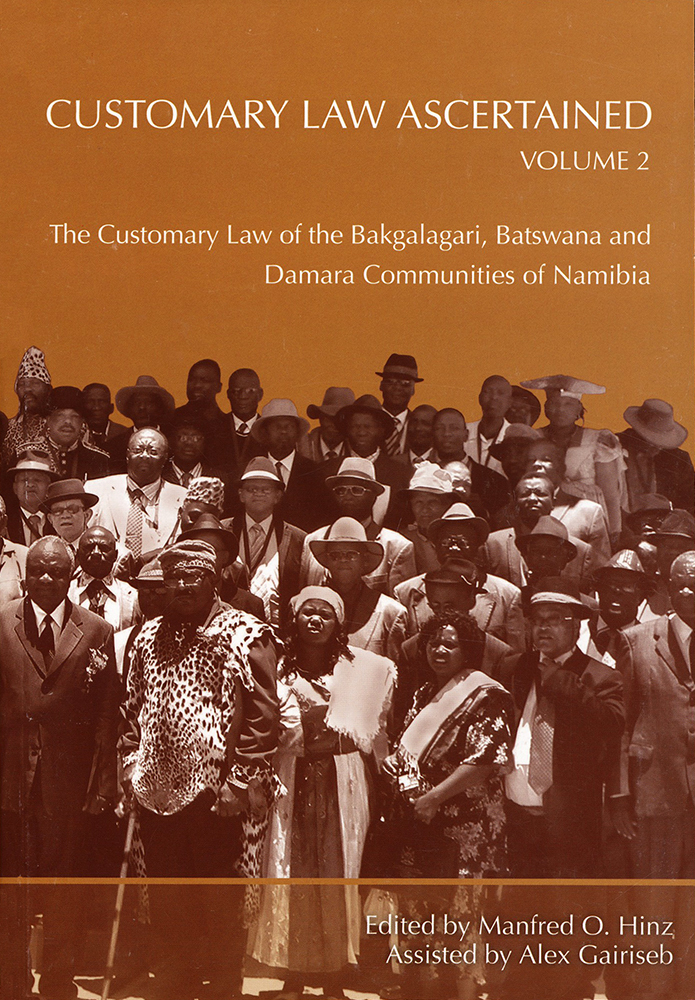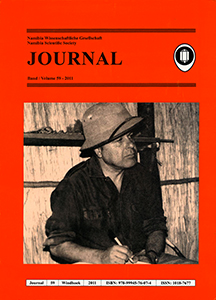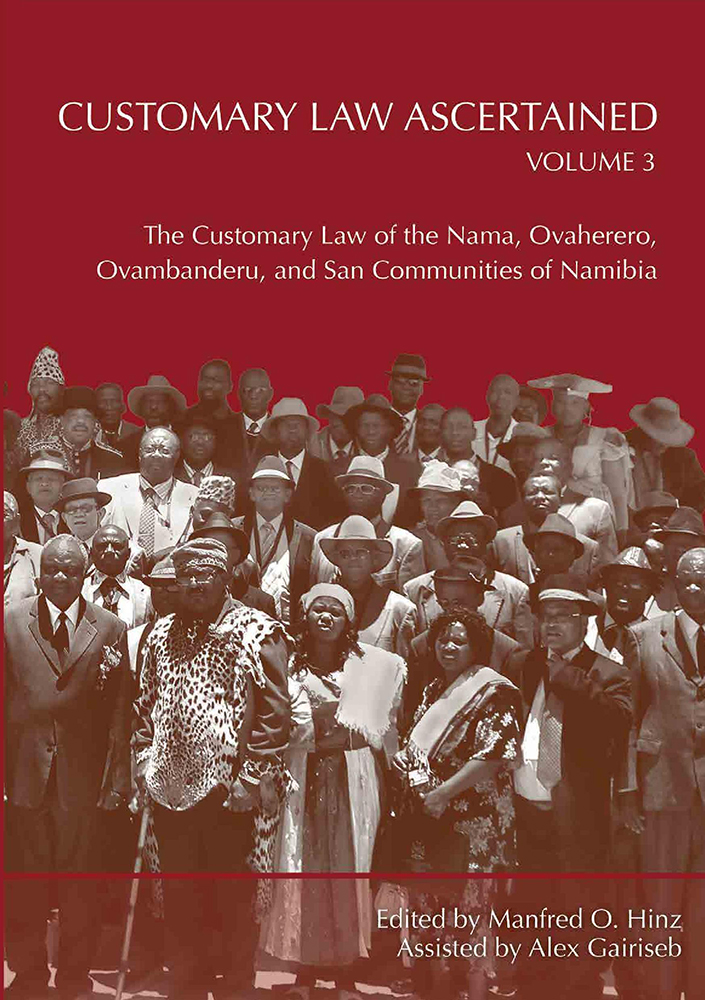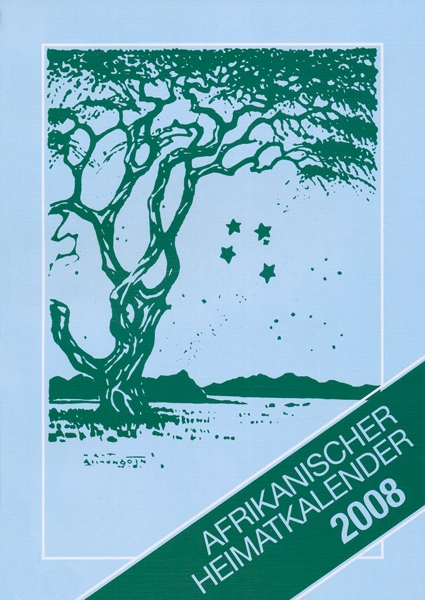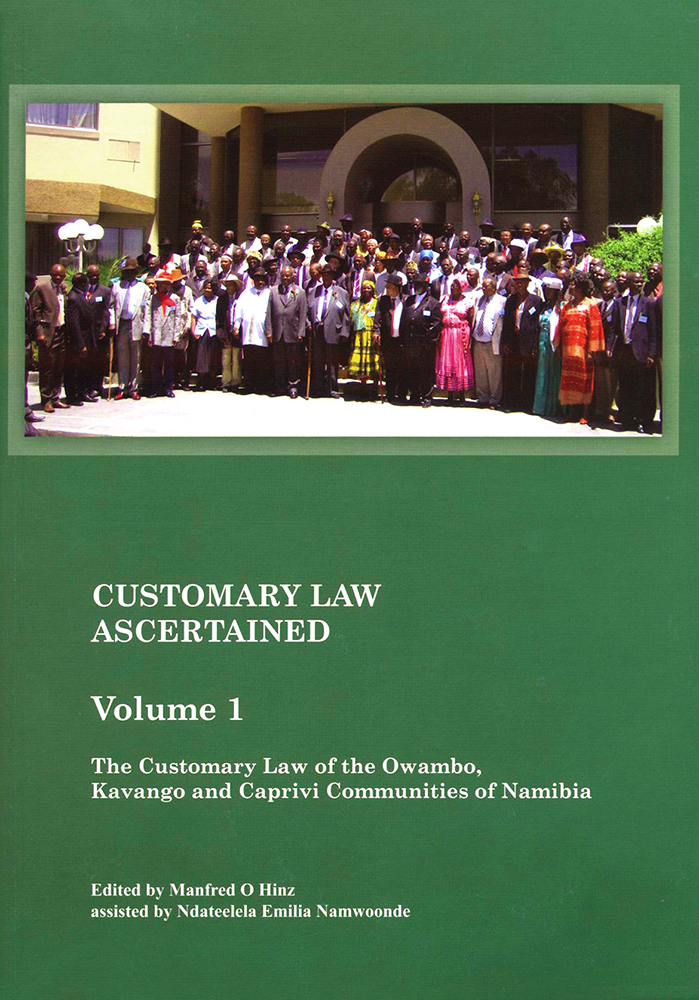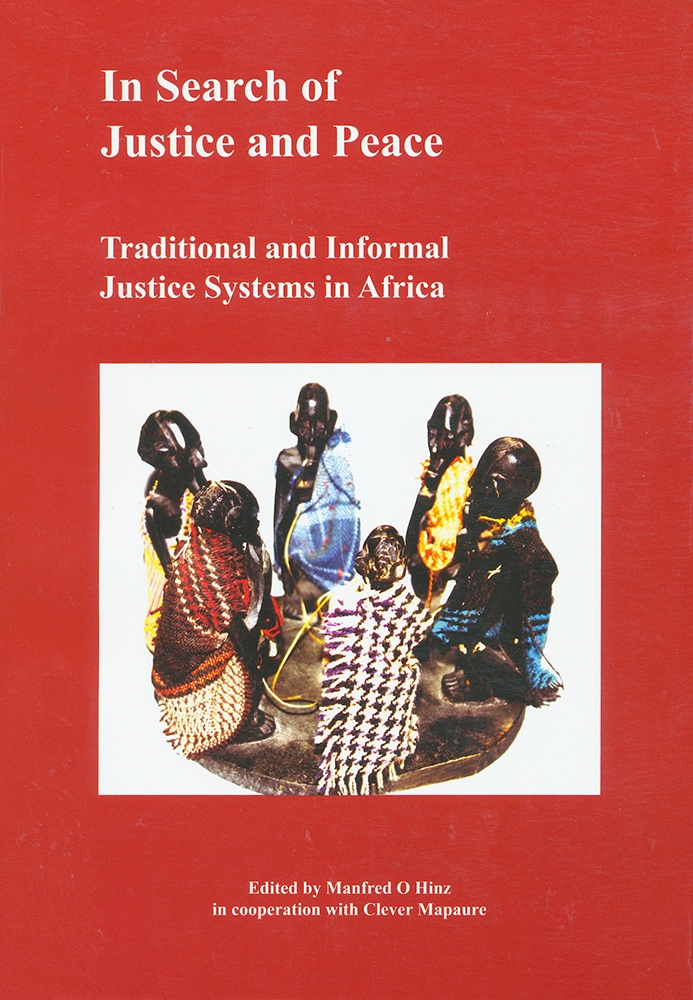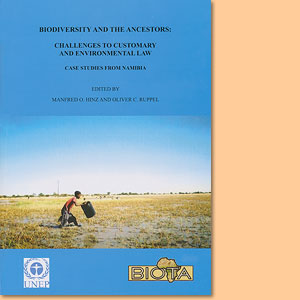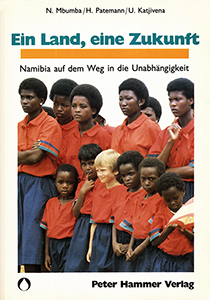Customary Law Ascertained (Vol 2): The Customary Law of the Bakgalagari, Batswana and Damara Communities of Namibia, by Manfred O. Hinz.
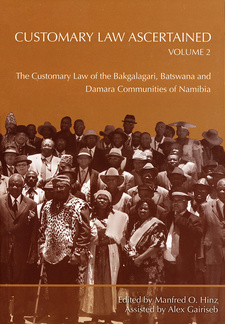
Customary Law Ascertained (Vol 2): The Customary Law of the Bakgalagari, Batswana and Damara Communities of Namibia, by Manfred O. Hinz. University of Namibia Press. Windhoek, Namibia 2014. ISBN 9789991642116 / ISBN 978-99916-42-11-6
Customary Law Ascertained Volume 2 is the second of a three volume series in which traditional authorities in Namibia present the customary laws of their communities. Edited by Manfred O. Hinz, it contains the laws of the Bakgalagari, the Batswana ba Namibia and the Damara communities.
The ascertainment of customary law: What is ascertainment of customary law and what is it for?
Legal comparisons inform us that different legal orders have different ways of manifesting law. While some keep law orally, others opt for law in writing. While some limit the writing of law to writing law incidentally, i.e. in the application of cases, others choose Introduction to Volume 1 to write law in an abstracted manner by way of selective statutory enactment or even comprehensive codification. Common law systems (English, American, Roman-Dutch) prefer the appearance of law through its application in cases. Civil law countries show a practice of codification, going back to the end of the 19th century. It is important to recall these differences in order to underscore that it would not be appropriate to point at one way of manifesting legal rules as the only acceptable way of doing so. If one goes deeper into the history of given legal systems, one will detect that very concrete societal circumstances prompted the developments of the various legal systems. A very enlightening current debate is that between proponents of common law, on the one side, and proponents of civil law, on the other, who argue about the adequacy of both approaches to provide legal answers to societal challenges. Do we need more or fewer statutory interventions? Is common law able to provide the necessary certainty in a globalising world? Would statutory interventions not contribute better to legal proactivity, whereas common would only be reactive? African customary law and the call for codification African customary law systems have, as African scholars hold, survived thousands of years as orally transmitted systems of law. They will not become 'more' law or lawlike by being codified. Common law has survived history and remained a highly valued system of law without being codified. Why then argue, as lawyers do, that African customary law must be codified? This argument has accompanied the discourse in African jurisprudence since the days when many of the now independent African states achieved their independence! Looking closer, it becomes obvious that many Western-educated lawyers from Europe and Africa never took it upon themselves to enquire about the nature of African law. For them, African customary law was very different from the law learned in school and, therefore, had to be changed to become similar to the mainstream of law taught at school. Indeed, African customary laws show differences to Western law because both forms of law are based on different concepts of justice, and maintain procedural rules geared towards achieving those concepts of justice. In view of this, and since there was no administration of justice in Africa comparable to the administration of common law that would produce reliable precedents, the call for codification appeared to be the easiest way to 'uplift' African customary laws to the so-called standard of real law [sic!]. That African customary laws would lose their flexibility to be applied by the communities in the interest of restoring peace and harmony among themselves was of no concern to the proponents of codification! Lawyers in francophone or lusophone countries could employ even more radical positions as the legal education obtained in these systems basically did not provide a place for customary law in their respective codified systems. The result we see right up to today in former French or Portuguese African countries is that African customary law lacks recognition and has remained second-class law, if law at all! [...]
This is an excerpt from Customary Law Ascertained (Vol 2): The Customary Law of the Bakgalagari, Batswana and Damara Communities of Namibia, by Manfred O. Hinz.
Customary Law Ascertained (Vol 2)
Subtitle: The Customary Law of the Bakgalagari, Batswana and Damara Communities of Namibia
Editor: Manfred O. Hinz
Series: Customary Law Ascertained
Publisher: University of Namibia
Windhoek, Namibia 2014
ISBN 9789991642116 / ISBN 978-99916-42-11-6
Softcover 17 x 24 cm, 526 pages
Hinz, Manfred O. im Namibiana-Buchangebot
Customary Law Ascertained (Vol 2): The Customary Law of the Bakgalagari, Batswana and Damara Communities of Namibia
Customary Law Ascertained (Vol 2) is the second of a three volume series in which traditional authorities in Namibia present the customary laws of the Bakgalagari, Batswana and Damara communities.
Journal 59-2011 (Namibia Wissenschaftliche Gesellschaft)
Dies ist die 59. Ausgabe des Journals der Namibia Wissenschaftlichen Gesellschaft von 2011.
Customary Law Ascertained (Vol 3): The Customary Law of the Nama, Ovaherero, Ovambanderu, and San Communities of Namibia
Customary Law Ascertained Volume 3 presents the customary laws the Nama, Ovaherero, Ovambanderu, and San communities of Namibia.
Afrikanischer Heimatkalender 2008
Afrikanischer Heimatkalender 2008: Seit 1930 Botschafter christlicher Werte in Namibia, mit vielen interessanten landeskundlichen, geschichtlichen, politischen und kulturellen Beiträgen.
Knowledge lives in the lake. Case studies in environmental and customary law from southern Africa
Knowledge lives in the lake: Case studies in environmental and customary law from southern Africa presents research within the framework of the international Biodiversity Monitoring Transect Analysis in Africa (BIOTA) Project.
Women and custom in Namibia
Is so called cultural practice surpressing gender equality in Namibia? The study Women and custom in Namibia seeks for answers and perspectives.
The customary law of the Owambo, Kavango and Caprivi Communities of Namibia
The customary laws of the Owambo, Kavango and Caprivi communities of Namibia were neglected during the past.
In search of Justice and Peace. Traditional and Informal Justice in Africa
In search of Justice and Peace introduces traditional and informal justice in various parts of Africa to secure justice and peace at the local level.
Biodiversity and the Ancestors. Challenges to Customary and environmental law case studies from Namibia
Spans an arc between legislative efforts on regional, national and local levels and traditional ways of maintaining the environment in Namibia
Ein Land, eine Zukunft. Namibia auf dem Weg in die Unabhängigkeit
'Ein Land, eine Zukunft. Namibia auf dem Weg in die Unabhängigkeit' will mit zahlreichen Beiträgen über Ideologie und Praxis des Kolonialsystems in Namibia sowie über politische und gesellschaftliche Utopien und Alternativen informieren.

